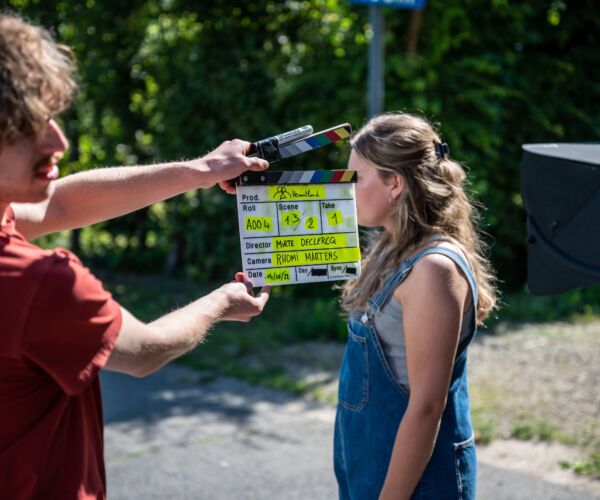Directing
As a student of audiovisual arts you can focus on directing and telling an audiovisual story, both fiction and stories from the real world.
You go through all stages of the directing process: developing the screenplay, an artistic vision worked out in a script, communicating to a crew, directing actors, directing and delegating, supervising post-production.
You develop yourself into a self-confident director with an original, poetic and dramatic eye for reality. You are able to interpret this reality creatively and artistically and have the potential to discover interesting lines in everyday life.
All this from a socially critical vision, strong dramaturgy and an engaging philosophical approach. Humour and abstraction are encouraged in a creative, free and playful framework. We pay attention to fiction film, documentary, hybrid forms and crossovers between different disciplines.
All classes are in Dutch.

Bachelor
During the first year of the Bachelor’s program, as a directing student, you will explore the fundamental concepts of cinema alongside students in writing, production, cinematography, sound design, and editing. You will be immersed in a rich environment of Art, Culture, and Film History; receive your first lessons in screenwriting, directing, and production; and participate in joint practical sessions focused on fiction and documentary. This first year lays the groundwork for future collaborations, with each student becoming increasingly specialised in their own discipline. At the end of the first year, you will present a personal, inspired piece of work.
In the second year, you will be challenged to sharpen your critical reflection on the audiovisual medium and its relationship with society. General subjects such as Film and Documentary Analysis, further study in Film History, Politics, Culture, and Philosophy will provide you with the necessary background to emphasise your own perspectives. As you progress, you will learn to adopt a professional attitude in focused and well-structured practical workshops in the second and third years, mirroring the professional context of the contemporary audiovisual world. This collaboration occurs as much as possible with fellow students from Writing, Directing, Production, Cinematography, Sound Design, and Editing, each contributing artistically from their specific talents. In some assignments, individual work is also encouraged. The practical work encompasses Fiction, Human Interest, Documentary, or hybrids of these forms.
Depending on your chosen pathway, you will also engage with Actor Direction, Screenwriting, Narratology, Editing and Research, Production Management, Music in Film, Post-Production, Interview Techniques, Cinematography, Sound Recording and Post-Production, and Editing.
In the third year, the specialisation will reach its peak. In various elective workshops, you will explore your own path and artistic style. You will learn to apply acquired skills in the pursuit of discovering your unique voice.
Master
The master’s program allows you to further develop your personal vision and style. The path you have taken in the bachelor’s program continues here. Everything starts from content: this is further explored and refined in research courses and an interdisciplinary research workshop. A selection of different masterclasses, often set in an international context, will provide artistic development and specific craftsmanship.
In the directing master's thesis, you have the freedom to present your 'own film' in any form of storytelling. The focus here is on the quest for creative authorship. You begin with personal research, challenge yourself, and work on finding your own voice and vision. From there, many forms are possible for telling your story, including hybrid projects that straddle the line between documentary and fiction. The emphasis is on creativity and authenticity.
ECTS sheets
If you want detailed info on the subjects (assessment, examination formats...), please visit our study guide where you can find all ECTS sheets of our programmes.
Admission test
To start this programme, you must first pass an artistic admission test. The admission test consists of three parts: a dossier, an intake or selection interview and a workshop week. Read more about the admission tests here.
Quality education
Erasmushogeschool Brussel pursues quality education and continuously develops its programmes to meet (inter)national quality standards. EhB puts maximum effort into developing a culture of quality and uses its own quality direction as a foundation for quality education.Various instruments guarantee the strengthening and safeguarding of the educational quality of this programme:
- In 2016, a programme accreditation took place for the Bachelor of Arts in audiovisual arts. Read the full report.
- The Dutch-Flemish Accreditation Organisation (NVAO) decided to accredit this programme for the period 2016 to 2024 in the accreditation decision.
The Flemish government's opleiding in cijfers website provides information on the profile of this programme such as who follows this programme, how long students take to obtain their degree, etc.
Read more about quality assurance within EhB.